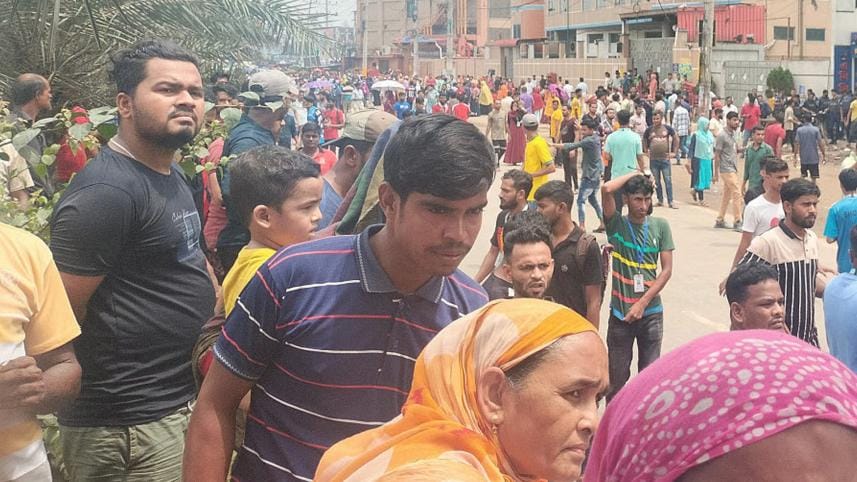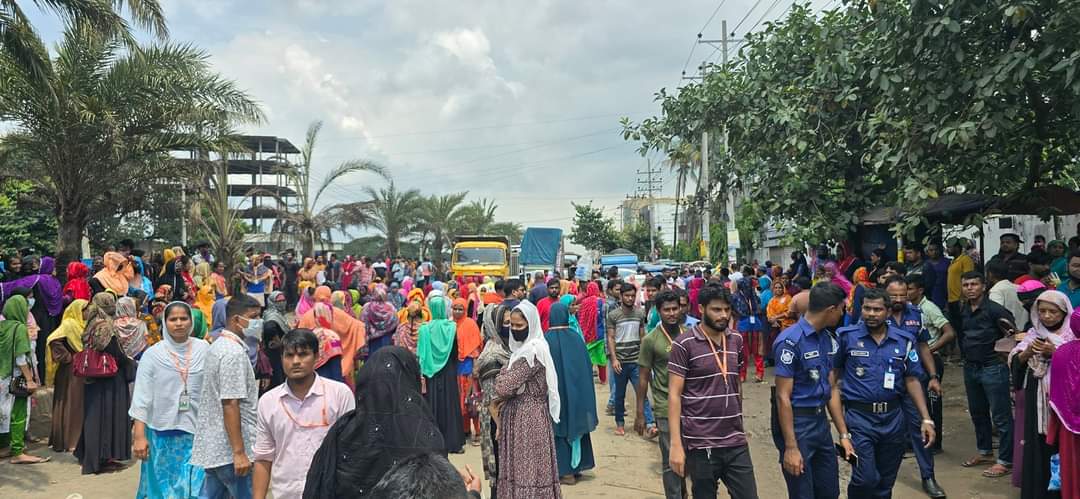Labour unrest intensifies

The interim government warned of tough steps against anarchy as around 200 factories suspended production yesterday amid labour unrest in Gazipur, Savar and Ashulia.
Local government ministry Adviser AF Hassan Arif yesterday said most of those causing the unrest are outsiders.
"We have not forgotten that a government does not use force against the citizens. But in the given situation, stern action has to be taken against certain people in order to save factories, workers and the economy. We discussed it," he said after an emergency meeting.
Five other advisers, top police and intelligence officers attended the meeting at the home ministry yesterday, the fifth consecutive day of labour unrest.
Khandoker Rafiqul Islam, president of Bangladesh Garment Manufacturers and Exporters Association, said at least 167 factories remained shut in Ashulia, Zirabo, Savar, and Gazipur.
Besides, over a dozen pharmaceutical factories also remained closed.
According to the BGMEA, the factories would resume production today.
At least 50 factories were closed on Tuesday and 100 the day before.
Hundreds of workers and "outsiders" have been demonstrating since Saturday, demanding better pay and regularisation.
The unrest is mainly affecting the garment and pharmaceutical companies.
Yesterday, at least 60 factories closed in Ashulia, reports our Savar correspondent.
From 8:00am, workers of different factories at Baipail and Zirabo began marching and demonstrating.
By 11:30am, there were demonstrations at multiple places on Baipail-Abdullahpur road, causing long tailbacks.
Industrial police, army and border guards were deployed in the area.
Workers blocked the Nabinagar-Chandra Highway at Palashbari around midday, the Dhaka-Mymensingh Highway in Gazipur around 7:30am, and Bhogra bypass road around the same time.
Many factories were closed in Gazipur, police told our Gazipur correspondent.
GOVT TO GO TOUGH
"Who will benefit if the factories are destroyed? The workers are not creating chaos. Most of those who are doing this are outsiders," said Adviser Hassan.
Addressing the workers, he said, "You stop them. If you stop them, we will be by your side."
He then remarked that it was hard to tell the workers from the outsiders.
As a reporter asked what kind of steps would be taken, he said, "We will think more about it. They can be arrested or detained. If 50 people sit on the road, five lakh suffer. You have to use force to remove them."
The other advisers who attended the meeting are Lt Gen (retd) Jahangir Alam Choudhury of home ministry, Prof Asif Nazrul of law, Farida Akhter of fisheries and livestock, Adilur Rahman Khan of industries, and Asif Mahmud Shojib Bhuyain of labour and employment.
Asif said both Awami League and BNP activists were behind the unrest in different places.
"Labour leaders told me that they visited the places and found that local homeless children, wearing helmets and shorts were hired for the different [protest] programmes," he said.
The Awami League supporters who used to control the business of leftover fabric were gone.
"I already said the government will take stern action against those trying to grab those businesses and committing crimes."
Asked who were trying to control the business, Asif Mahmud said, "There are local Awami League leaders in some places. We also have information that some local BNP leaders are involved.
"We are talking to the central leaders of the BNP … so that they restrain them [local leaders]. We will take a tough stance against the local influential Awami League leaders who are still there. They will be arrested, and police will take action as per law," he said.
BGMEA President Rafiqul told a press conference that the factory owners agreed to keep all the factories open from today as army, border guards, police and Rab would be deployed near the factories.
He added that some factories had been vandalised.
"We are very careful not to tarnish our image before the foreigners, particularly to the clients," he said.
Police will gain the confidence they lost because of the questionable role played by some policemen during the mass uprising that toppled the government, he added.
Intelligence agencies learned that two or three groups were involved in the unrest, he added.
Workers are not directly involved with the anarchy, he said.
Abdullah Hill Rakib, BGMEA vice president, said the industry needed cooperation political parties' cooperation.
PHARMACEUTICAL UNITS
Abdul Muktadir, president of the Bangladesh Association of Pharmaceutical Industries (BAPI), said workers assaulted guards in different factories.
The unrest, which has been continuing for over a couple of weeks, has halted production at 19 major pharmaceutical plants.
"We are not getting proactive support from the government and the law enforcement agencies. The sector is not getting the importance," he told The Daily Star yesterday.



 For all latest news, follow The Daily Star's Google News channel.
For all latest news, follow The Daily Star's Google News channel. 
Comments